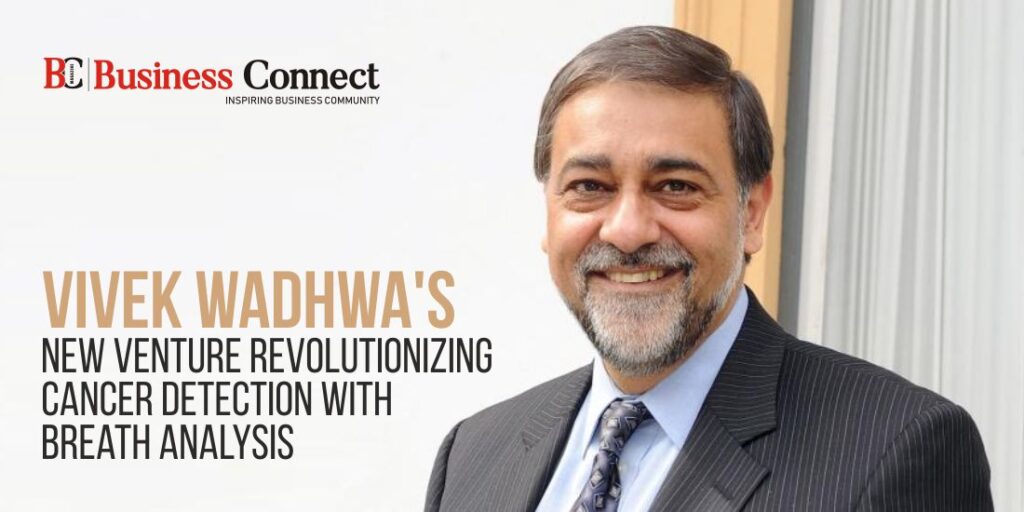Vivek Wadhwa’s New Venture Revolutionizing Cancer Detection with Breath Analysis
Written by Sanjay Kumar
Silicon Valley luminary Vivek Wadhwa has embarked on an audacious endeavor, seeking to detect cancer in individuals by analyzing their breath, akin to a breathalyzer test. Wadhwa, a prominent entrepreneur and academic, has discreetly founded a company named Vionix Biosciences Inc., marking the inception of this groundbreaking venture.
Vionix Biosciences Inc. aspires to gather crucial health information with a minimally invasive approach, a goal that has long tantalized technologists but has often eluded realization. In contrast to the infamous case of Elizabeth Holmes and her ill-fated blood-testing startup, Theranos, Wadhwa is adopting a cautious and measured approach. He has enlisted the expertise of advisors from esteemed institutions such as Harvard Medical School, the Mayo Clinic, and Massachusetts General Hospital to substantiate the feasibility of this concept. Wadhwa has personally invested approximately $500,000 in the project and is committed to injecting an additional $500,000, even dipping into his retirement savings, with the ambitious aim of developing a functional prototype by late 2023 or 2024.
If successful, this innovative device could potentially revolutionize certain aspects of cancer screening and facilitate earlier detection, particularly in underserved communities. However, significant challenges lie ahead before this dream can become a reality.
Born in India and later immigrating to the United States, Wadhwa made his mark in the technology industry, founding two companies and authoring five books. He also held prestigious teaching positions, including heading the faculty at Singularity University, dedicated to solving global issues through entrepreneurship.
Wadhwa’s public commentary career has been marked by both acclaim and controversy. He has authored opinion columns in The Washington Post that challenged the tech industry’s lack of meritocracy, long before acknowledging racial and gender disparities became mainstream. Additionally, he championed initiatives to empower women in the industry, though some critics found his advocacy to be condescending, prompting him to let women take the lead on the issue eventually.
However, Wadhwa’s life took a profound turn when his wife, Tavinder, fell ill during a family vacation in Mexico in 2018 and was diagnosed with a rare form of cancer. Subsequently, Wadhwa devoted significant time to understanding the disease, consulting experts, and even engaging with renowned figures in the health and tech sectors, such as Sean Parker, co-founder of Napster and a philanthropist heavily invested in cancer research.
His personal journey led him to the realization that doctors require a tool capable of conducting on-site tests offering a higher level of detail than current methods. His vision was a portable device, costing no more than $5,000, consuming minimal power, and capable of producing results within five minutes—packaged in a device roughly the size of a desktop printer.
Realizing this vision poses significant challenges, as breath measurement is a complex endeavor. Several companies, including the UK’s Owlstone Medical and researchers at the University of Colorado at Boulder, are also exploring breath diagnostics, with promising results in various applications.
By July, Wadhwa was ready to establish Vionix dedicated to cancer detection. Initially considering blood tests, he shifted focus after consulting with diagnostics specialists, discovering that breath may contain compounds related to lung and breast cancer, among others.
Once Vionix successfully handles breath tests—an ambitious and unproven task—it intends to expand into blood tests, urine tests, and eventually, saliva tests, all consolidated into a single device. This multifaceted approach utilizes a cold plasma-based process licensed from a Chilean research group and will harness artificial intelligence to recognize disease biomarkers more comprehensively and accurately than existing tools.
The portability of the Vionix device aims to facilitate its use both within and outside clinical settings. This feature could prove especially invaluable in impoverished or rural areas, according to Keith Flaherty, a Harvard Medical School professor and director of clinical research at Massachusetts General Hospital’s cancer center. Flaherty, an advisor to Vionix, compared the venture to a “time machine,” acknowledging the promise but urging caution and rigorous testing to determine its efficacy.
In light of the cautionary tale of Elizabeth Holmes and Theranos, Wadhwa pledges transparency and ethical rigor in his approach. Rather than conducting in-house validations, he intends to invite external researchers to utilize Vionix and document their findings. Wadhwa’s overarching goal is clear: “No secrecy, no ethical lapses, no obsessions with making money.” Nevertheless, if he secures funding, he envisions building a profitable company potentially worth billions.
As Vionix Biosciences Inc. strives to develop its groundbreaking cancer detection device, the world watches with anticipation and hope for a new era in early cancer diagnosis, one that may transform the landscape of healthcare for the better.
Must Read:-
- Stock Market Update
- Top 10 shoe brands in India for men & women 2023
- Top 10 Adorable Gifts for Your Special One
- Top 10 Countries with Maximum Indian Population as Citizens
- Top 10 Small Business Statistics You Need to Know For 2023
- Top 10 highest-paid CEO in the World
- Top 10 richest person of India
- Top 10 Highest-Paid CEOs of India
- Top 10 Most Selling Bikes and Scooters of 2022 in India
- The Success Story of Jeff Bezos
- Success Story Of Elon Musk
- Top 10 Business Newspaper In India



